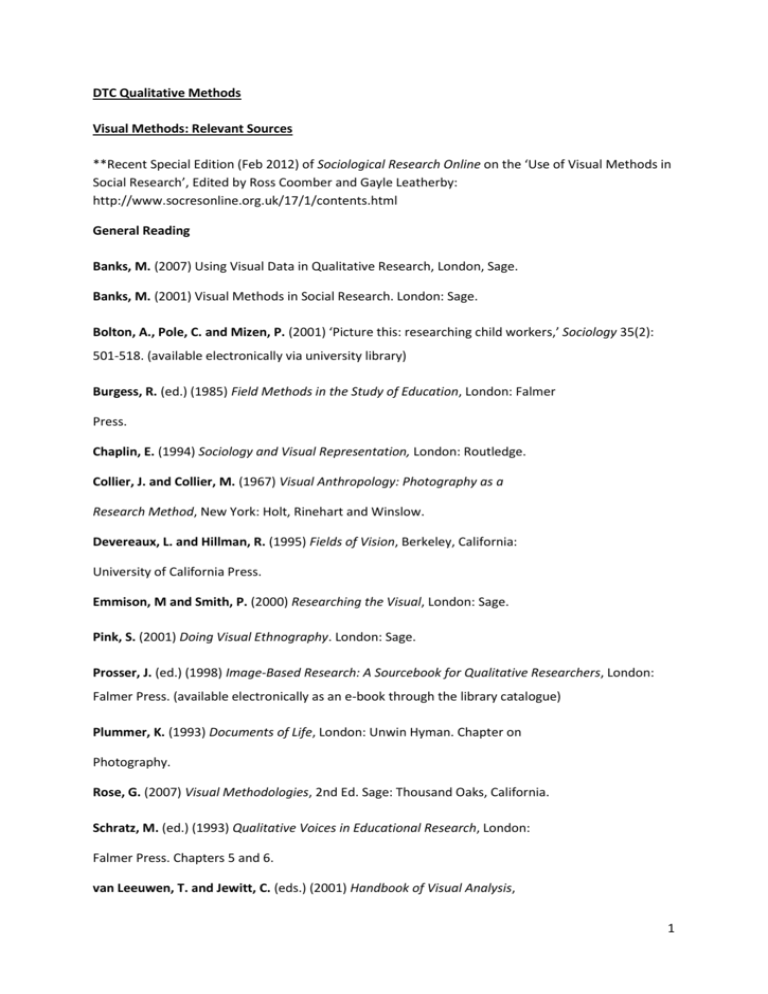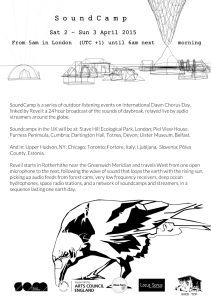DTC Qualitative Methods Visual Methods: Relevant Sources
advertisement

DTC Qualitative Methods Visual Methods: Relevant Sources **Recent Special Edition (Feb 2012) of Sociological Research Online on the ‘Use of Visual Methods in Social Research’, Edited by Ross Coomber and Gayle Leatherby: http://www.socresonline.org.uk/17/1/contents.html General Reading Banks, M. (2007) Using Visual Data in Qualitative Research, London, Sage. Banks, M. (2001) Visual Methods in Social Research. London: Sage. Bolton, A., Pole, C. and Mizen, P. (2001) ‘Picture this: researching child workers,’ Sociology 35(2): 501-518. (available electronically via university library) Burgess, R. (ed.) (1985) Field Methods in the Study of Education, London: Falmer Press. Chaplin, E. (1994) Sociology and Visual Representation, London: Routledge. Collier, J. and Collier, M. (1967) Visual Anthropology: Photography as a Research Method, New York: Holt, Rinehart and Winslow. Devereaux, L. and Hillman, R. (1995) Fields of Vision, Berkeley, California: University of California Press. Emmison, M and Smith, P. (2000) Researching the Visual, London: Sage. Pink, S. (2001) Doing Visual Ethnography. London: Sage. Prosser, J. (ed.) (1998) Image-Based Research: A Sourcebook for Qualitative Researchers, London: Falmer Press. (available electronically as an e-book through the library catalogue) Plummer, K. (1993) Documents of Life, London: Unwin Hyman. Chapter on Photography. Rose, G. (2007) Visual Methodologies, 2nd Ed. Sage: Thousand Oaks, California. Schratz, M. (ed.) (1993) Qualitative Voices in Educational Research, London: Falmer Press. Chapters 5 and 6. van Leeuwen, T. and Jewitt, C. (eds.) (2001) Handbook of Visual Analysis, 1 London: Sage. Walker, R. and Wiedel, J. (1985) ‘Using photographs in a Discipline of Words’. In Wells, L. ed. (2000) Photography: A Critical Introduction, London: Routledge. On domestic photography: Chalfen, R. (2000) ‘Interpreting Family Photography as Pictorial Communication’ in J. Prosser, ed. Image-Based Research, London: Falmer. Haldrup, M, and J. Larsen (2003) ‘The Family Gaze’, Tourist Studies 3(1):25-45. Hirsch, M. (ed.) (1999) The Familial Gaze, Dartmouth College Press. Hirsch, M. (1997) Family Frames, Cambridge: Harvard University Press. Kuhn, A. (1995) Family Secrets: Acts of Memory and Imagination, London: Verso. Kuhn, A. (1991) ‘Remembrance’ in J. Spence and P. Holland (eds) Family Snaps, London: Virago, pp 17-25 Kuhn, A. and K.E.McAllister (eds) (2006) Locating Memory: Photographic Acts, NY: Berghan Books. Chapter 4. ‘A Story of Escape: Family Photographs from Japanese Canadian Internment Camps’ and Chapter 10. ‘Speaking the Album’ are particularly interesting. Lalvani, S. (1996) Photography, Vision and the Production of Modern Bodies, Albany: State University of New York Press. Pp. 47-69. Pauwels, L. (2008) ‘A Private Visual Practice Going Public? Social Functions and Sociological Research Opportunity of Web-Based Family Photography’ Visual Studies 23 (1), pp. 34-49. Rose, G. (2003) ‘Family Photographs and Domestic Spacings: A Case Study’ Transactions of the Institute of British Geographers 28 (1):1-18. Slater, D. (1995) ‘Domestic Photography and Digital Culture in M Lister (ed.) The Photographic Image in Digital Culture, Routledge. 2 Spence, J. and P. Holland (eds) (1991) Family Snaps: The Meaning of Domestic Photography, London: Virago. On ethics and visual methods: British Sociological Association (BSA), Statement of Ethical Practice www.britsoc.org.uk/about/ethic.htm Pauwels, L. (2007) ‘The Ethics of Picturing People and Using People’s Pictures: a visual researcher’s dilemma’, IVSA Conference paper. Prosser, J. (no date) Vital Signs: Researching Real Life Visual Ethics, http://www.reallifemethods.ac.uk/events/vitalsigns/programme/presentations/vital -signs-5c-prosser.pdf Prosser, J et al (2008) Visual Research Ethics at the Crossroads, Working Paper #10 at http://www.socialsciences.manchester.ac.uk/realities/publications/workingpapers/ 10-2008-11-realities-prosseretal.pdf Prosser, J. (2000) ‘The Moral Maze of Image Ethics’, Simons, H. and Usher, R. (eds.), Situated Ethics, London: Routledge Sliwinski, S. (2004) ‘A Painful Labour: responsibility and photography’, Visual Studies, 19(2), 150-161. On photo-elicitation interviewing: Clark-Ibanez, Marisol (2007), ‘Inner-city Children in Sharper Focus: Sociology of Childhood and Photo Elicitation Interviews’, G. Stanczk (ed.), Visual Research Methods: Image, Society and Representation, London: Sage Clark-Ibanez, Marisol (2004) ‘Framing the Social World with Photo -elicitation Interviews’, American Behavioral Scientists, 47, 12, 73-89. Collier, John Jr. and Collier, Malcolm (1986) Visual Anthropology: photography as a research method, Albuquerque, NM: University of Mexico Press. Esp. Chap 8. 3 Harper, D. (2001) Changing Works: Visions of a Lost Agriculture, Chicago: Chicago University Press. Chapter 2: ‘Research with Photographs’. Wright, C.Y. et al (2010) ‘Visual research methods: using cameras to empower socially excluded black youth’, Sociology, 44 (3): 541-558 (available electronically via university library). Examples of visual analysis and visual methodologies: Berger, John and Jean Mohr (1982) A Seventh Man: A Book of images and Words about the Experience of Migrant Workers in Europe,London: Writers and Readers Other relevant books by John Berger include Ways of Seeing (1972) and Another Way of Telling (1982) Furman, F. (1997) Facing the Mirror: Older Women and Body Shop Culture, New York: Routledge. Dant, T. and David Bowles (2003) ‘Dealing with Dirt: Servicing and Repairing Cars’ Sociological Research Online 8(2) http://www.socresonline.org.uk/82/dant.html Goffman, E. (1979) Gender Advertisements, London: Macmillan. Lutz, C. and Collins, J. (1993) ‘The Photograph as an Intersection of Gazes,’ in L. Wells, ed. The Photography Reader, London: Routledge. Lutz, C. and J. Collins (1997) ‘The Colour of Sex: Postwar Photographic Histories of Race and Gender’ in National Geographic Magazine’ in R.N. Lancaster and M. di Leonardo, eds The Gender/ Sexuality Reader, New York: Routledge. Lutz, C. and J. Collins (1993) Reading National Geographic, University of Chicago Press. Sontag, S. (1979) On Photography, Harmonsworth: Penguin. Sontag, S. (2005) Regarding the Pain of Others, London: Penguin. Wolkowitz, C. (2001) ‘The Working Body as Sign: Historical Snapshots’ in K. Backett-Milburn and L. McKie, eds Constructing Gendered Bodies, Basingstoke: Palgrave 4 See also the journal Visual Studies. Spatial and Mobile Methods Anderson, J. (2004) ‘Talking whilst walking: a geographical archaeology of knowledge’, Area 36(3): 254-61 (available online) Büscher, M. and Urry, J. (2009) ‘Mobile Methods and the Empirical,’ European Journal of Social Theory 12(1): 99-116 Certeau, M. de (1984) The Practice of Everyday Life, Berkeley: University of California Press. Lefebre, H. (1991) The Production of Space, Oxford: Basil Blackwell. Mah, A. (2012) Industrial Ruination, Community, and Place, Toronto: University of Toronto Press (especially chapter 5) Massey, D. (1994) Space, Place and Gender, Minneapolis: University of Minnesota Press. Moles, K. (2008), ‘A Walk in Thirdspace: Place, Methods and Walking’ Sociological Research Online 13(4)2 http://www.socresonline.org.uk/13/4/2.html (available online) Sinclair, I. (2002) London Orbital: A Walk Around the M25, London: Penguin. Soja, E. (1996) Thirdspace: Journeys to Los Angeles and Other Real-and-Imagined Places, Oxford: Blackwell. Urry, J. (2007) Mobilities, Cambridge: Polity (Chapter 2: Mobile theories and methods). Multi-sensory Methods Senses and Society journal: http://www.sensorystudies.org/the-senses-and-society/ 5

